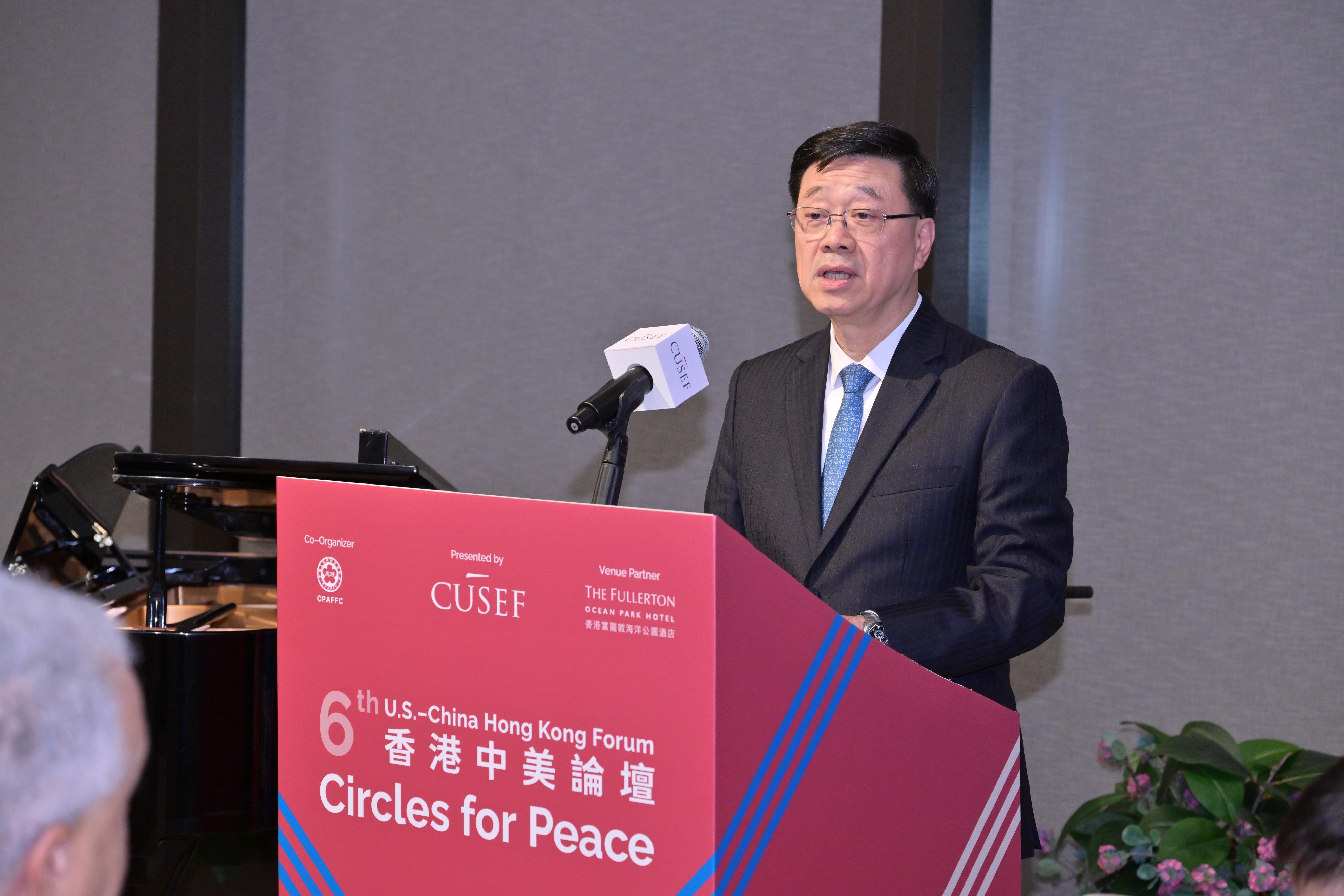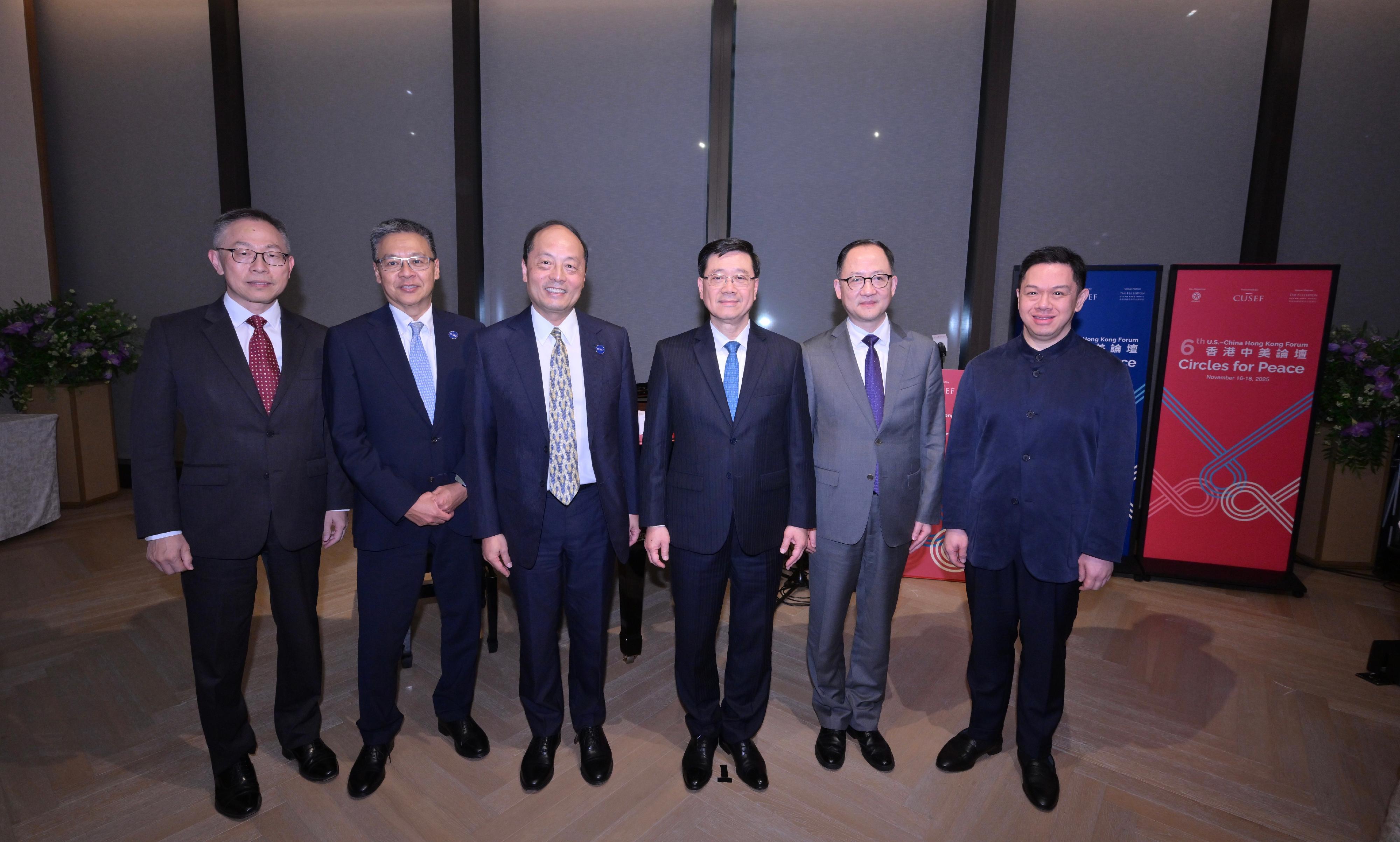Speech by CE at welcome dinner of 6th US-China Hong Kong Forum (English only) (with photos/video)
******************************************************************************************
Honourable Deputy Commissioner Hua You of the Office of the Commissioner of the Ministry of Foreign Affairs in the Hong Kong Special Administrative Region, Honourable Mr John Zhao (Chairman of China-United States Exchange Foundation), Honourable Mr Shen Xin (Vice President of the Chinese People's Association for Friendship with Foreign Countries), distinguished guests, ladies and gentlemen,
Good evening. I'm very delighted to be here, tonight, for this welcome dinner of the sixth US-China Hong Kong Forum.
I would like to begin by thanking the China-United States Exchange Foundation for, once again, bringing us together. Working with the Chinese People's Association for Friendship with Foreign Countries, the Foundation stages this important forum to bring us together. Bring the two largest economies in the world together.
You believe, as I do - as the vast majority of the world does - that a constructive relationship between China, our country, and the United States is essential for global well-being. And for the global economy, in pursuing mutually rewarding opportunities.
As we all know, mutually rewarding opportunity is having a difficult, even daunting, year, for China-US relations.
President Xi Jinping, in his October meeting with the US President Trump, pointed out that China and the US, and I quote, "should be partners and friends. This is what history has taught us and reality needs."
Unfortunately, "reality" has often been sidelined in China-US relations today. That means that Hong Kong-US ties - a special component within the China-US relationship - are also affected, despite a US diplomatic presence here, going back more than 180 years.
The US has ensnared Hong Kong in its world-wide tariffs' web. Its self-made-up story of reciprocal tariffs for the so-called unfair, unbalanced trade in the case of Hong Kong is absolutely flawed. The US has been enjoying one of the largest bilateral merchandise trade surpluses with Hong Kong. Last year alone, the trade surplus surpassed US$ 21 billion, the second-largest among its trade partners. Over the past decade, the US has run up a trade surplus with Hong Kong worth more than US$ 271 billion, the largest among its trading partners.
America's trade with Hong Kong supports more than 140 000 American jobs, from agriculture to fashion, manufacturing and much more.
Not surprisingly, nearly 1 400 US companies were operating in Hong Kong as of last year. That makes the US Hong Kong's second-largest source of foreign-affiliated companies. That, let me add, was up 117 companies, year-on-year.
According to the American Chamber of Commerce in Hong Kong's 2025 Business Sentiment Survey, 75 per cent, three quarters, of its surveyed members reported either stable or increased revenue last year, compared to 2023.
More than 80 000 US citizens live and work in Hong Kong, confident and comfortable in a city they share so many common values with.
They can see, for themselves, the "one country, two systems" principle in action, in dynamic action, how Hong Kong connects East and West, and in so many ways, for so many economies and businesses and peoples.
Under the unique "one country, two systems" principle, Hong Kong is the only world city that converges both the China advantage and the global advantage. We boast a long and established tradition of the rule of law, a common law system shared by most global financial hubs, and a judiciary that exercises its judicial power independently, free from any interference.
Equally important, our people, and business owners, share Hong Kong's commitment to open and free trade. We are, after all, a founding member of the World Trade Organization.
The so-called "reciprocal tariff" for Hong Kong is therefore out of sense given that the trade balance between us is tilted heavily in favour of the US. And the fact that Hong Kong does not impose customs tariffs on goods from the US - or any other country.
Hong Kong will continue, I assure you, to do what we've always done. We champion free trade and create opportunities for local businesses and investors, and the economies, companies and investors they do business with.
With the firm support of our country, Hong Kong is fast developing its eight centres of excellence, and maintain a pivotal role in such national strategies as the Belt and Road Initiative and the Guangdong-Hong Kong-Macao Greater Bay Area. We are flush with opportunities - mutual opportunities. And in that, we continue to roll out a welcome mat for the US businesses and investors.
They can take confidence in our free trade policies, our simple and low tax regime - free from sales tax, capital gains tax, estate duty and tax on dividends - and our free flow of information, capital, goods and talent.
Speaking of talent, the Swiss-based International Institute for Management Development, in its 2025 World Talent Ranking, rated Hong Kong fourth in the world, and tops in Asia.
Our talent initiatives of the past three years are working. And well. Since we rolled out an enhanced talent attraction regime at the end of 2022, we have received applications from over 550 000 professionals and young talent around the world. Over 376 000 applications have been approved, and around 250 000 of them have already arrived in Hong Kong. They are graduates from top universities, high earners in their industries, technology talent, and more. They bring with them expertise, experience and, more importantly, impetus to our economy.
More than talent, Hong Kong has also proved highly attractive to a world of business. Last month, OASES, the Office for Attracting Strategic Enterprises I set up three years ago, welcomed nearly 20 new key companies to Hong Kong, including three of the world's top pharmaceutical corporations. That takes the number of strategic companies in Hong Kong, thanks to OASES, to 102, 16 of which are, yes, American companies - more than any other overseas country.
We're pleased to have them here, creating employment, initiating R&D (research and development) projects and investing in Hong Kong's future - and theirs.
No doubt, they will also love Hong Kong's rising place as the world's East meets West centre for international cultural exchange.
In the end, ladies and gentlemen, dialogue is always better than confrontation. Collaboration is more effective than unilateralism.
But, of course, no one knows that better than the China-United States Exchange Foundation, and all of you here this evening.
Your theme for this year's two-day Forum, "Circles for Peace", surrounds AI (artificial intelligence), geopolitics and people-to-people ties. And I understand that some 50 prominent speakers, from all over the world, will engage those issues and their global import before an audience of some 500 strong.
Beyond this Forum, you also engage a broader, and even more diverse, audience. Thanks to the Foundation's efforts, more than 3 000 students have taken part in exchange programmes between our country and the US over the years.
And this year, the Foundation hosted the first US-China Art Dialogue in Hong Kong during Art March and the annual Art Basel art fair. Nearly 100 artists and arts aficionados from the US and China discussed how arts and artists can encourage people-to-people ties between the US and China.
In hosting inspirational events, and in many other ways, we will make it abundantly clear that global peace, and prosperity, can only be achieved through dialogue, mutual respect and leadership.
In that, China and the United States must play the leading roles.
The world also needs moderators and mediators. And I believe that Hong Kong and the China-United States Exchange Foundation have more than some experience to offer.
My thanks to the Foundation, and to the Chinese People's Association for Friendship with Foreign Countries, for once again organising this very important US-China Hong Kong Forum.
I wish you all a rewarding Forum, and a very enjoyable evening. Thank you.
Ends/Monday, November 17, 2025
Issued at HKT 22:15
Issued at HKT 22:15
NNNN




